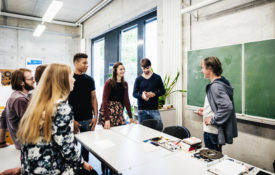-
The Replication Crisis Devastated Psychology. This Group is Looking To Rebuild it.
The 2017 Great American Solar Eclipse left Chris Chartier feeling, well, a little jealous. Chartier, like so many Americans, was awed by the whole country coming together to celebrate a force of nature. Chartier is a psychologist, and he also started to think of how precise the eclipse forecast was. Astronomers knew, down to the second, when the moon would cross the path of the sun; where, precisely, its shadow would land; and for how many seconds the sun would appear to be blocked out for those on the ground. Chartier’s field — social psychology — just doesn’t have that type of accuracy. “Things are really messy,” says Chartier, who’s an associate professor at Ashland University in Ohio.
-
Gender-Affirming Health Care Should Be a Right, Not a Crime
APS Fellow/Author: Kristina R. Olson In late March, the Arkansas State House and Senate voted to prohibit health care workers in the state from providing gender-affirming health care to transgender and other gender-diverse young people. While the decision was vetoed by the governor on April 5, the state legislature overrode that veto the next day. Meanwhile the Alabama State Senate approved a law in March to make it a felony for doctors to provide gender-affirming health care to transgender youth. And a bill proposed in North Carolina would outlaw gender-affirmative care for people younger than 21. Several other U.S.
-

Pursuing Best Practices in STEM Education: The Peril and Promise of Active Learning
The latest issue of Psychological Science in the Public Interest examines a promising yet loosely defined STEM instructional technique known as “active learning.”
-

Older Adults More Likely to Make the Effort to Help Others
New research suggests that, all things being equal, older adults are more likely to offer help than younger adults.
-
The Curious Construct of Active Learning
Psychological Science in the Public Interest (Volume 22, Number 1)Read the Full Text (PDF, HTML) Active learning has become a ubiquitous construct in education—particularly undergraduate education in science, technology, engineering, and mathematics (STEM). However, despite its prevalence, active learning remains an unclear construct. Different researchers and educators may have different definitions of what active learning is and which activities foster active learning and improve learning outcomes. In this issue of Psychological Science in the Public Interest (Volume 22, Issue 1), Doug Lombardi, Thomas F.
-

New Research in Psychological Science
A sample of research on political moderation, unconscious touch perception, sexual arousal in transgender men, explicit instruction and reading, emotion and memory for future events , and the reliability of functional MRI.

